Lucky Eagle RV Park
First Ever RV Stop
Easy back in spot - we decided just to stay in the main casino parking lot because it was easy and we didn’t need black water hookups for this evening. Pretty simple but also .. a parking lot!
The forested areas surrounding Littlerock, Washington include a variety of developed campgrounds and natural settings for outdoor stays. Millersylvania State Park Campground offers amenities for tent, RV, cabin, and yurt camping with year-round availability, while American Heritage Campground provides similar accommodations including cabin options. Located approximately 15 miles from Olympia, the region includes mixed-use campgrounds like Middle Waddell, which caters to both tent camping and off-road vehicle enthusiasts, and dispersed camping areas such as Rock Candy Mountain Trailhead.
Most developed campgrounds in the area require campsite reservations, especially during summer months, though walk-in availability may exist during shoulder seasons. The Littlerock region experiences mild, wet winters and moderately warm summers, with camping possible year-round at several locations. Many campgrounds require a Washington State Discover Pass for day use or overnight stays, with Middle Waddell requiring the $10 state parks pass. Sites with RV hookups tend to fill quickly on summer weekends, while primitive camping areas remain available later into the reservation window. A camper noted, "Great campground. Great price. Just had to purchase a Washington state parks pass for $10. Had great biking and atv trails right by the campground."
Campground layouts and privacy levels vary significantly across the Littlerock area. Several visitors mentioned that campgrounds with RV hookup sites often place units close together with minimal separation, while tent-specific areas typically offer more seclusion. Millersylvania State Park receives positive reviews for its lake access and hiking trails through forested settings. According to one review, "This is a very nice, typical Washington state park with plenty of trees, greenery, hiking, pathways and even a lake. There's a camp store along with several large outdoor kitchens that would be good to use for groups." Visitors frequently mention the historic CCC-built structures at some parks as notable features. Campers seeking mixed-use experiences can access both traditional camping and off-road vehicle recreation at Middle Waddell Campground, which features trail connections directly from the camping area.
$12 - $45 / night
"This is a very nice, typical Washington state park with plenty of trees, greenery, hiking, pathways and even a lake."
"This is a beautiful park located on Deep Lake just outside of Olympia. The park itself is huge offering lots of options for campers. "
$40 - $60 / night
"We had a little trouble finding this spot because an industrial area moved in around the campground. Signs tell you where it is, but it feels wrong."
"Site #5 is close to main office where you can get wifi if you want, we declined though. Restrooms were good. No issues. Will definitely return again soon!"
"Just had to purchase a Washington state parks pass for $10. Had great biking and atv trails right by the campground."
"Close to town yet still secluded in the woods. Tons of trails for hiking, horses and dirt bikes! Plenty of sites for trailers and tents. Vault toilets, picnic tables, fire rings and water hook ups."
"Easy access to sound paved road pedestrian underpass. Great camp host and nearby ranger station. Nearby Brinnon Wa. Some restaurants and oyster raising areas locally."
"The staff was so friendly and the surroundings fairly peaceful and wooded. This isn’t fancy, and there are quite a few long-timers, but it was as expected."
"Completely dispersed tent or rv camping with a Washington Discovery Pass ($35 year) otherwise FREE for up too 7 days."
"There’s hiking trails all around you!"
"You are supposed to have a Washington State Discovery pass to stay here, also they want you to fill out self registration once you arrive, fyi there are no pens onsite to do so."
"We had our choice of campsites, near hiking trails and the creek. The road wasn't too rough to get there, and we were able to park nearby. What more do you need?"
"There are hiking trails close by but be sure to do your homework because there are many trails that allow ATV, horses, bikes, and people on them."
"There is a bunch of awesome trails with beautiful surroundings for every level of hikers and if you can find your way to Porter Falls, you definitely wont be disappointed with the view!"
"In the anderson location with water and power. Room for 26' travel trailer, tow vehicle with a couple feet breathing room."
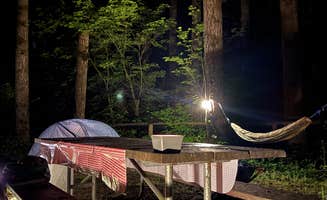
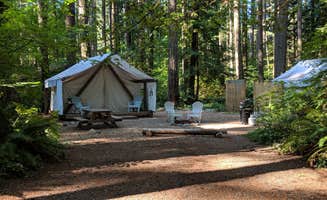
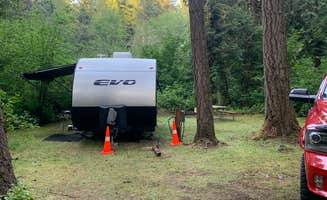
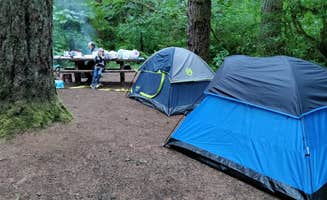
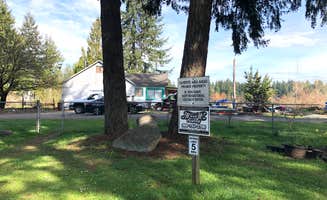
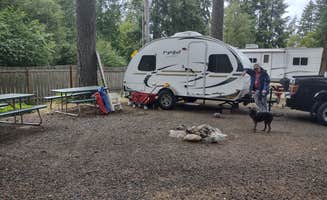
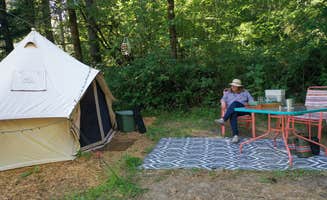
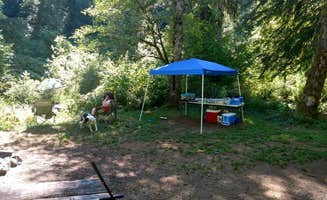
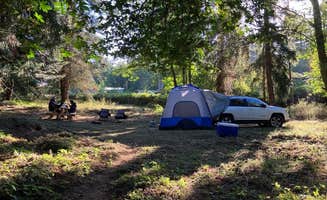
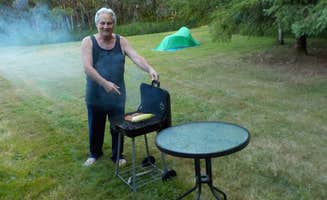
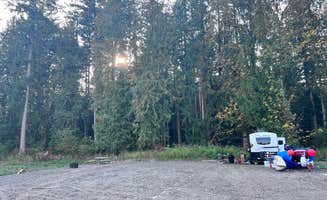
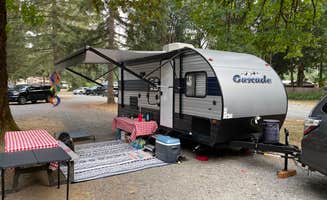
Easy back in spot - we decided just to stay in the main casino parking lot because it was easy and we didn’t need black water hookups for this evening. Pretty simple but also .. a parking lot!
Not a large spot but plenty of room for car camping or even a single tent. It does get cold up here was about 32F when I was there.
host was very nice, site is right across from easy water access. beautiful kayaking and many harbor seals.
dont leave anything unattended by the boat launch, we were stupid enough to leave our paddles there and one was stolen overnight oddly enough.
also minutes from 2 margaritas! cute small mexican resteraunt with a nice breakfast menu
Fantastic area
Sites were large enough and far enough apart to maintain some privacy. Water was still on at the site in late November. There is an RV clean out near the entrance.
Fairly new RV park in our area. Original main site is directly across the street from the Chehalis River. New waterfront site is right on the river edge.
This park is within 15 miles of home. Quiet with a few lakeside spots for dry camping. Fishing swimming. Hiking. Boat ramp.
Attached to the pub and restaurant. Quiet and off the beaten path.
We stayed here a while when we came off fulltiming. Then stored our 5er here for a few months. Full hookups and lots of long term residents
Camping spots near Littlerock, Washington feature diverse terrain with elevations ranging from 200-600 feet across the region's mixed coniferous forest. Capitol Forest dominates the landscape with 110,000 acres of managed timberland offering primitive campgrounds. Winter camping requires preparation for frequent precipitation with average temperatures between 35-45°F from November through March.
Hiking trails access: Capitol Forest provides extensive trail networks from Margaret McKenny Equestrian Campground with terrain suitable for day hikes. "There are hiking trails all around you!" notes camper Abby M., who appreciated the surrounding trail system during multiple visits.
River exploration: The waterways at Porter Creek offer natural swimming areas during summer months. "The river is gorgeous and fun to explore!" says Jessica A., highlighting the natural water features that make this primitive campground appealing despite basic amenities.
Lake activities: Deep Lake at Millersylvania provides swimming, fishing and paddling options from late spring through early fall. "We did some paddle boating, dipped our toes into the water, and purchased snacks at the small store," explains Geanna R., describing recreation options that work well for weekend trips.
Spacious sites: Many Littlerock area campgrounds feature well-designed camping areas with adequate separation. At American Heritage Campground, "The lots are well plotted with space and privacy," according to steve F., noting the thoughtful layout that provides campers with breathing room.
Camp store conveniences: Several established campgrounds maintain on-site stores with camping necessities. American Heritage Campground provides "ice and wood available for purchase as well as a small general store," explains Mary C., mentioning practical amenities that reduce the need for trips to town.
Off-road trail access: Direct trail connections from Middle Waddell Campground serve ATV and motorcycle enthusiasts. "Had great biking and atv trails right by the campground," reports Britney T., highlighting the convenience of trails that begin directly from camping areas.
Campsite reservations: Most developed campgrounds fill quickly during peak season (June-September). According to Christina F., "After months of trying to get reservations for this popular campground, we finally got one for Thanksgiving weekend!" at Millersylvania State Park, demonstrating the planning needed for prime spots.
Seasonal flooding: Some campgrounds experience significant drainage issues during rainy periods. At Fall Creek Campground, winter camping requires checking conditions as creek levels fluctuate with rainfall.
Discover Pass requirements: Most natural areas require Washington's recreation pass. "Just had to purchase a Washington state parks pass for $10," notes Britney T. about Middle Waddell Campground, referencing the mandatory permit for overnight stays.
Mixed-use considerations: Capitol Forest serves multiple recreational groups simultaneously. "This is thw campgrpund were you camp if you have or enjoy motorcycles or quads or 4x4s," Cassandra G. explains about Middle Waddell, highlighting the motorized recreation focus that might not suit all campers.
Group facilities: Some campgrounds offer dedicated areas for larger gatherings. "The shelter was large and had water and power," Ellen T. notes about Millersylvania's group camp area, providing insight into facilities that accommodate family reunions or multi-family trips.
Playground access: Rainbow Falls State Park Campground features kid-friendly recreation areas. "Big open field for playing, horseshoe pits, small playground, river trail, and fishing," reports ashley E., listing activities that keep children engaged.
Swimming options: Water access varies significantly between camping areas. "The lake is great. You're packed in pretty close to each other, but the trees provide pretty good insulation," says Jed G. about Millersylvania State Park, noting both the recreational opportunity and proximity considerations for families.
Site spacing: RV areas offer varying degrees of separation between units. Amy B. found American Heritage Campground provided "the privacy of the heavily wooded individual sites," which creates natural boundaries between camping spaces.
Winter hookups: Cold weather camping requires specific electrical considerations. At Millersylvania, Christina F. notes: "They urge campers to use their propane heaters and not use electricity. We were berated for using 'close to 30A', because if too many neighbors are using electricity, youll have a blackout."
Road conditions: Access routes to more remote camping spots can challenge larger vehicles. Porter Creek receives caution from reviewers about the approach road: "Not suitable for anything wider than a class B. In my opinion this area is not suitable for winter camping," particularly during wet weather when forest roads deteriorate.
Frequently Asked Questions
What camping is available near Littlerock, WA?
According to TheDyrt.com, Littlerock, WA offers a wide range of camping options, with 203 campgrounds and RV parks near Littlerock, WA and 11 free dispersed camping spots.
Which is the most popular campground near Littlerock, WA?
According to TheDyrt.com, the most popular campground near Littlerock, WA is Millersylvania State Park Campground with a 4.1-star rating from 34 reviews.
Where can I find free dispersed camping near Littlerock, WA?
According to TheDyrt.com, there are 11 free dispersed camping spots near Littlerock, WA.
Keep Exploring